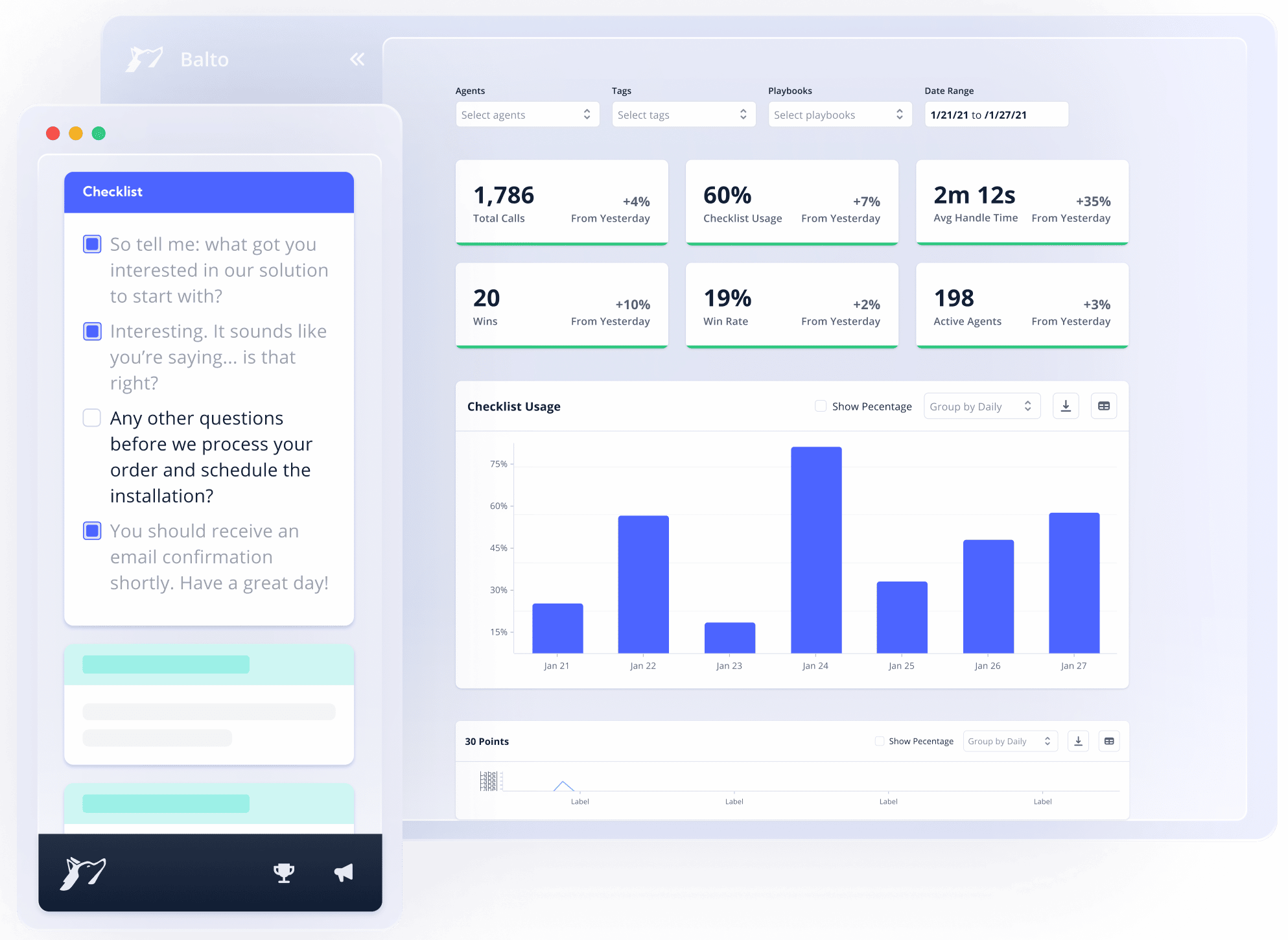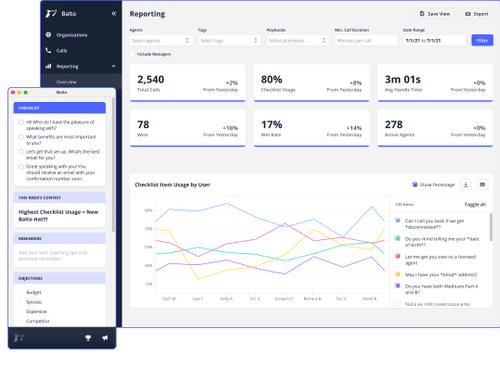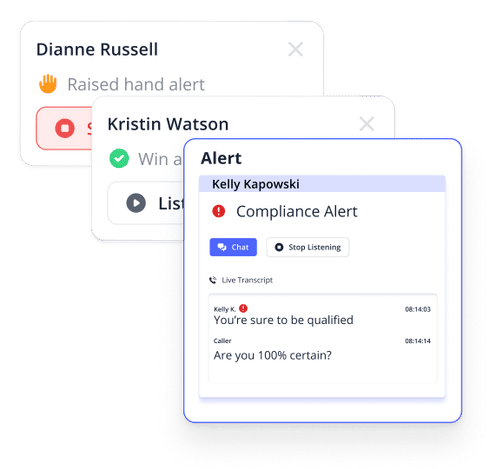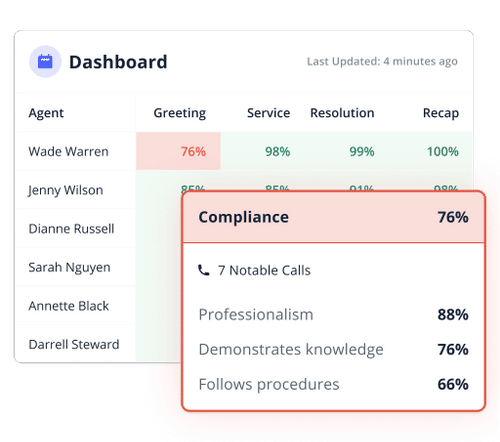“BALTO IS CALL CENTER MAGIC”
Randy Clapp, CRO, Advantage Communications
Increase in CSAT
Faster Ramp Time
Faster Customer Service
Explore the Real-Time
Guidance Platform
Optimize your contact center scripts with software that uses the power of artificial intelligence
Call Center Compliance
Call centers are one of the most important elements of customer service. For many organizations, it is primarily through call centers that they communicate with their customers. From credit card numbers to birth dates and account numbers, sensitive information is constantly passing into these hubs. If this information were compromised or improperly handled, serious lawsuits can be the result.
Furthermore, there are also standards and laws that call center reps must comply with in terms of what promises they make to the customer so that no one ever has grounds for a lawsuit against the business. For example, if a rep says “You’re guaranteed”, and then the customer finds out that they are not guaranteed, that commitment could be grounds for a lawsuit. Or consider a customer sharing his or her credit card information with the representative. That is very sensitive information that needs to be handled correctly in order to follow good call center compliance.
Unfortunately, once a mistake occurs, it can be very difficult to fix it. A non-compliant call cannot be reversed. That’s why you need to make sure to prevent these kinds of mistakes at your call center before they happen. That’s what great contact center compliance is all about. Now, you may be wondering, how do I catch mistakes before the call is over?
The answer to that question is to use a real-time guidance platform like Balto. Balto is a platform that monitors all calls and offers real-time suggestions to your reps so that they always know the best thing to say. The system automatically scores all calls and can notify managers of call center coaching moments. All of these features tie in well to helping your call center maintain compliance.
First, our real-time monitoring makes suggestions to reps in real time to use more compliant language so that they can correct any mistakes before the call is over. Secondly, our system records and analyzes every single call so that you have precise records of every call you make. Thirdly, our system can also make recommendations in real time to notify managers at your center if there is a moment where they should step in.
On any call, there are a certain number of things that must be shared with the customer to be compliant. Balto helps agents remember all the little details that can lead to lawsuits if forgotten. One of our system’s key features is the Smart Checklist which reminds agents exactly what needs to be said. Whenever a rep makes a non-compliant statement, our platform will automatically provide a handy pop-up notification, assisting the agent to correct their course as the conversation continues. These are all ways in which Balto can help your call center remain in compliance with all relevant standards and laws in your industry.
Compliance Call
A compliance call is a call that is compliant with standards and laws. For example, in a compliance call, the company must secure consent from both the agent and the customer to record conversations. Failing to do so would make the call non-compliant.
We’re using the term compliance call, meaning that the call does not create any potential grounds for lawsuits. Another example of call center compliance is ensuring that you make absolutely zero calls to any number on the DNC registry. The DNC (Do Not Call) registry was set up by the Federal Trade Commission to provide a way for people to register their phone numbers and ensure that they never receive telemarketing calls. If your call center does call a number on this list, they can face some hefty fines to the tune of thousands of dollars.
There are many other such laws and standards which your call center has to follow. This is all about contact compliance, meaning following the law when making or receiving calls at your contact center. In the moment, it can be difficult for your reps to remember every single requirement, which is why it makes sense to give them the tools they need to do their job well. Why not help your reps to succeed with call center quality assurance on every single call by utilizing a solution like Balto?
Call Center Rules And Regulations
As we’ve mentioned, there are many call center rules and regulations for employees of contact centers that your call center team needs to follow. Let’s look at some examples of these rules and regulations so that you can get a better idea of how you can stay compliant.
If you are in the healthcare industry, your reps will need to understand and follow all HIPAA regulations. HIPAA stands for the Health Insurance Portability and Accountability Act of 1996 and is basically a set of privacy rules designed to protect the privacy of health information. Complying with this regulation would include things like not recording private health information and not requesting any unnecessary details about the customer.
Call center regulatory compliance is crucial but can be difficult to deal with. How can you be sure that you’ve covered every single law with your employees? Furthermore, how can you know that every representative on your team understands these rules and how to comply with them? A platform like Balto can help you remain compliant by notifying managers of important compliance issues during the call. This gives managers the opportunity to reach out to agents instantly via live chat. The manager can then coach the agent in real time so that they can turn the situation around and make the call a success.
Whether you are in healthcare or any other industry, your call center must also comply with the Telephone Consumer Protection Act, or TCPA, a set of rules we look at next.
TCPA Regulations
The Federal Communications Commission (FCC) has set several laws and FCC call center regulations to protect consumers. The TCPA is one such set of regulations that place restrictions on telemarketing calls and advertisements.
For example, the law sets time restrictions that prevent reps from calling prospective customers at night. The Do Not Call (DNC) list is also created and maintained by the TCPA regulations. There are also restrictions on how many rings you should wait before disconnecting an unanswered telemarketing call as well as for who you can call without express written permission.
It can be hard to get past all the legalese in regulations like this, so it may be wise to go out and find a TCPA compliance checklist. These checklists can be shared with your agents and reps so that they know exactly what they need to say and do to remain compliant. This can be helpful, but what about other standards and laws? Are you going to rely on a separate checklist for each of them?
Balto knows all these standards and uses artificial intelligence to monitor each and every call in real time for compliance with all relevant laws and regulations. Plus, our solution features its own checklist that ensures you are compliant with all laws at once. This makes it so much easier to keep in compliance.
Call Center 101
We’ve been talking about call center regulations this entire time, but are you sure you even know what a call center is and how one works? Let’s go through a very brief call center 101. A call center is often a physical office setting (although remote is increasing in popularity) where employees known as customer service representatives or agents manage inbound or outbound calls depending on what the goals are of the business running the center. To set up your call center, you could look at a call center requirements checklist and follow that. It’s also important to use a call center compliance checklist as well to help you abide by the law.
Call Center Standard Operating Procedures
Once your call center is set up, you’ll want to ensure that your team is following the best call center standard operating procedures (SOPs). The standard operating procedure for inbound call center locations is different from the standard operating procedure for outbound call center spaces. Inbound call centers focus on managing incoming calls like customer questions or concerns. This contrasts with outbound call centers that have SOPs designed to facilitate proactive calls outside the call center to customers and prospective customers. Telemarketing teams would fall into this category.
SOPs are all about systemization, a concept that is crucial for good teamwork and smooth operations. Balto helps systemize call center management and operations with its Smart Checklist that reminds agents to say critical statements word-for-word and includes a dynamic prompt to show them exactly when to use compliant phrases and responses.
Call Center Setup Project Plan
When setting up your call center, you’ve got many things to consider, including regulations and call quality monitoring procedures. Looking at a call center policies example can be a helpful way to get inspiration for how you should deploy your own center. You could also find a call center checklist template that would serve as a reference for developing your own call center checklists for your reps.
As you develop your call center setup project plan, you should consider the incorporation of a tool that can help you remain fully compliant with all regulatory requirements and do so much more to make sure that every single call at your call center comes off a success. This tool is called Balto.
Related Pages
Call Center Compliance | Sales Coaching | Contact Center Software | Call Center Management | Call Center Software | Customer Service Skills | Conversation Intelligence | Call Center Scripting Software | Call Center Script




